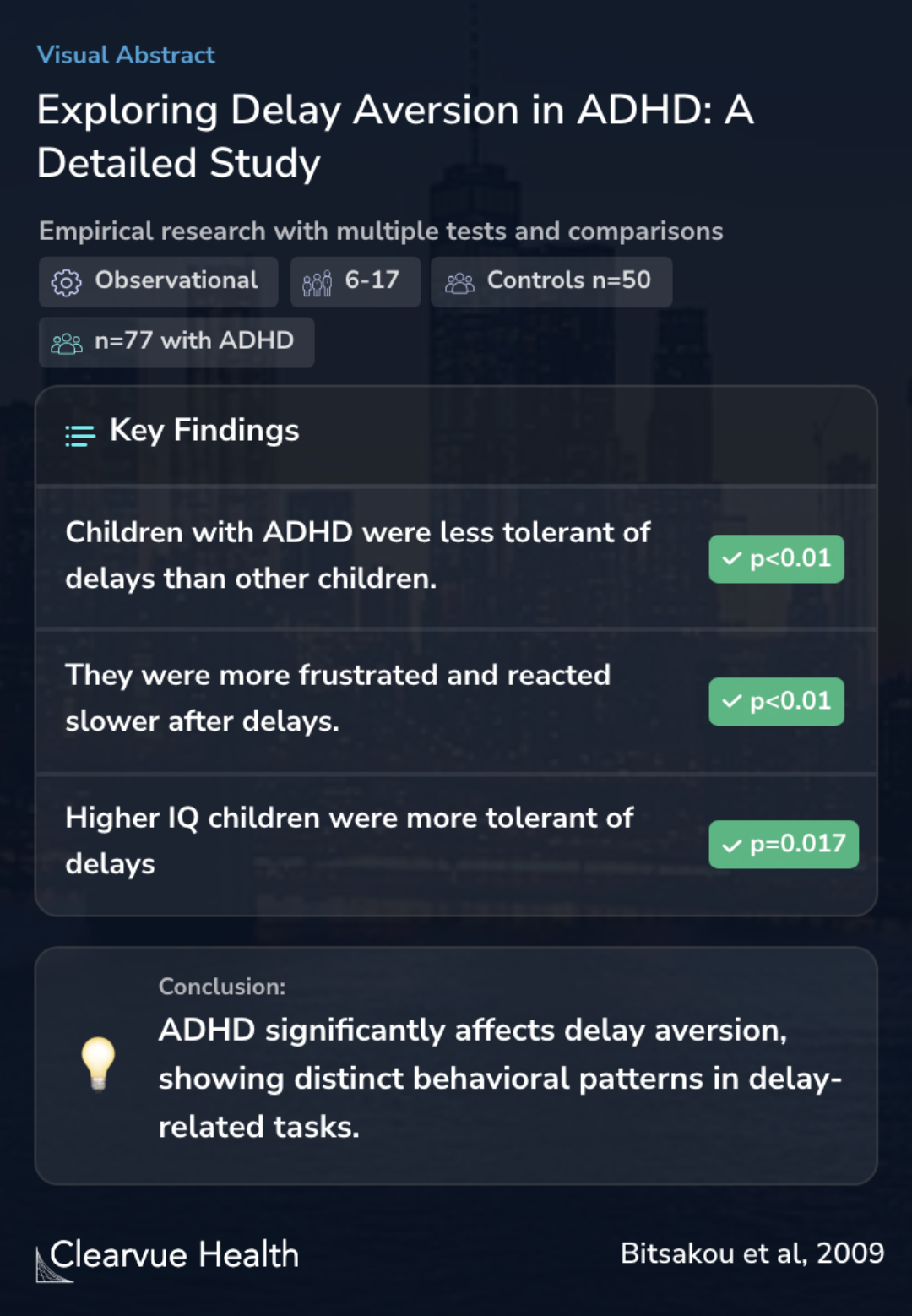Delay Aversion in Attention Deficit/Hyperactivity Disorder: an empirical investigation of the broader phenotype
Exploring Delay Aversion in ADHD: A Detailed Study
Bitsakou P, Psychogiou L, Thompson M, Sonuga-Barke EJ

Objectives
The study focused on understanding how Attention Deficit/Hyperactivity Disorder (ADHD) affects delay-related motivational processes in children. Specifically, it explored the impact of ADHD on children's behavior in three areas: choosing immediate over delayed rewards, reaction times following a delay, and the level of frustration experienced due to delay. This investigation aimed to determine if these behaviors form a common Delay Aversion (DAv) construct that differentiates children with ADHD from those without the condition, and to see if this pattern is evident within families.
Delay-related motivational processes are impaired in children with Attention Deficit/Hyperactivity Disorder (ADHD). Here we explore the impact of ADHD on the performance of three putative indices of Delay Aversion (DAv): (i) the choice for immediate over delayed reward; (ii) slower react...
Methods
The study involved 77 individuals aged 6-17 with ADHD, 65 of their siblings who did not have ADHD, and 50 non-ADHD controls. Participants completed three delay tasks to measure their responses to delayed gratification.
Seventy seven male and female individuals (age range 6-17) with a research diagnosis combined type ADHD, 65 of their siblings unaffected by ADHD and 50 non-ADHD controls completed three delay tasks.
Results
In this study, scientists found out that children with ADHD react differently than other kids when it comes to waiting for things. They tested this by seeing how children chose between getting something right away or waiting for a better reward later. They also looked at how quickly children reacted after having to wait and how frustrated they got if they had to wait.
Even though the differences in how each child reacted were small, they noticed a common pattern among children with ADHD. These kids were different from those without ADHD in all the tests. They were less patient, got more frustrated, and were slower to react after waiting.
Another important thing they found was that children with a higher IQ, or smarter kids, were better at dealing with delays. This means that smarter kids with ADHD might be a bit more patient than those with a lower IQ. This shows us that ADHD affects children in different ways, and things like how smart a child is can make a difference in how they handle waiting.
As predicted the size of the correlation between tasks was small but a common latent component was apparent. Children with ADHD differed from controls on all tasks (d=.4-.7) and on an overall DAv index (d=.9): The battery as a whole demonstrated moderate sensitivity and specificity. In g...
Conclusions
The study showed that ADHD has a big effect on how kids deal with waiting. Children with ADHD showed different behaviors compared to kids without ADHD when it came to waiting for things. This tells us that ADHD is not just a simple condition, but it has many different parts, especially when we think about how it affects a child's patience and decision-making. These results help us understand ADHD better, showing us that kids with ADHD might act in different ways because of how their brains work.
The results illustrate the power of multivariate approaches to endophenotypes. By highlighting the significant, but limited, role of DAv in ADHD these results are consistent with recent accounts that emphasize neuropsychological heterogeneity.
Key Takeaways
Context
In 2011, researchers like Wilson studied children with ADHD and how they handle waiting for rewards. They found that these children preferred to get smaller rewards right away rather than waiting for bigger ones later. This study is similar to what we just learned about kids with ADHD having a hard time waiting. It adds to the idea that ADHD might affect how well someone can wait for things.
Another study looked at how certain parts of the brain can make people more impulsive. Damage to specific areas of the brain, like the ventral striatum and frontal cortex, can lead to more impulsive decisions. This supports what we learned about kids with ADHD and their struggle with waiting, showing that it could be linked to how their brains are structured.
Lastly, a study by Zheng in 2022 found that children with ADHD often think time is passing more slowly than it really is. They're not as good at guessing how much time has passed. This finding is interesting because it suggests that children with ADHD don't just struggle with waiting because they're impatient, but also because they might perceive time differently than other kids.